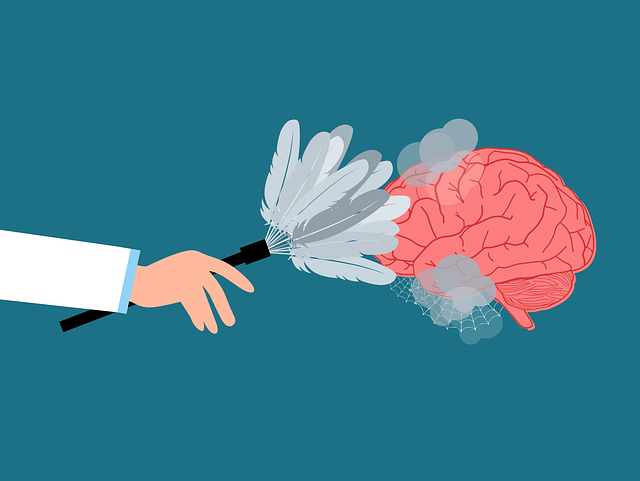In Denver, a multi-faceted approach addresses Post-Traumatic Stress Disorder (PTSD) through specialized therapy like CBT and EMDR, public awareness campaigns, mental wellness promotion, and community initiatives. These comprehensive strategies empower individuals to overcome PTSD, heal, and reclaim their lives with support and resilience. Search for Denver Post-Traumatic Stress Disorder Therapy to find tailored treatment and recovery paths.
Mental wellness promotion is a critical aspect of fostering resilient communities, especially in urban centers like Denver. This city, known for its vibrant landscape, also faces challenges related to post-traumatic stress disorder (PTSD), impacting many residents.
This article explores effective strategies to enhance mental health after trauma, with a specific focus on Denver and the therapeutic approaches available. By understanding PTSD and leveraging therapy, individuals can overcome adversity and lead fulfilling lives.
- Understanding Post-Traumatic Stress Disorder (PTSD) in Denver
- Strategies for Promoting Mental Wellness After Trauma
- The Role of Therapy in Overcoming and Managing PTSD
Understanding Post-Traumatic Stress Disorder (PTSD) in Denver

In Denver, understanding Post-Traumatic Stress Disorder (PTSD) is a crucial step in promoting mental wellness. PTSD can affect individuals who have experienced or witnessed traumatic events, leading to persistent symptoms such as flashbacks, nightmares, and severe anxiety. Local therapy services play a vital role in helping Denvers recover by providing specialized treatments like cognitive behavioral therapy (CBT), eye movement desensitization and reprocessing (EMDR), and exposure therapy. These evidence-based approaches help individuals process traumatic memories and regain control over their lives.
Public awareness campaigns and emotional well-being promotion techniques are also essential in the combat against PTSD. By educating the community about the signs and symptoms of PTSD, we can foster an environment that encourages those affected to seek help. Moreover, confidence-boosting initiatives within Denver communities can empower individuals to navigate their mental health journeys with resilience and support.
Strategies for Promoting Mental Wellness After Trauma

After experiencing trauma, promoting mental wellness is a crucial step towards healing and recovery. Individuals in Denver suffering from post-traumatic stress disorder (PTSD) can benefit from various strategies that foster emotional well-being. One effective approach is engaging in consistent therapy sessions tailored to address PTSD symptoms. Cognitive Behavioral Therapy (CBT), for instance, has been widely recognized as an impactful method to help individuals process traumatic memories and develop healthier coping mechanisms.
Additionally, designing mental health education programs can empower individuals with knowledge about trauma recovery. These programs often incorporate emotional well-being promotion techniques, such as mindfulness exercises and stress management strategies, enabling people to take proactive steps towards healing. The production of a mental wellness podcast series can also be an engaging way to reach and support those affected by trauma, offering valuable insights and personal stories while encouraging open conversations about mental health in the Denver community.
The Role of Therapy in Overcoming and Managing PTSD

Post-Traumatic Stress Disorder (PTSD) is a complex mental health condition that can significantly impact an individual’s daily life and well-being. Therapy plays a pivotal role in helping those affected by PTSD navigate their experiences, manage symptoms, and regain control. Denver Post-Traumatic Stress Disorder therapy offers specialized approaches tailored to address the unique challenges of this disorder. One effective method is cognitive behavioral therapy (CBT), which focuses on identifying and changing negative thought patterns associated with traumatic events. Through CBT, individuals learn valuable communication strategies to express their feelings and emotions in a healthy way.
Additionally, exposure therapy is commonly used to help patients confront and process their traumatic memories safely. This involves gradual exposure to distressing reminders of the trauma, enabling individuals to manage their responses and reduce anxiety over time. Risk management planning for mental health professionals is essential when treating PTSD patients, ensuring a secure environment that fosters trust and empathy building strategies. Effective therapy provides individuals with coping mechanisms, enhances resilience, and promotes long-term recovery from PTSD, offering them a chance to reclaim their lives and find peace.
In the context of Denver post-traumatic stress disorder (PTSD) therapy, understanding and implementing effective strategies for mental wellness promotion are essential. The article has highlighted the significance of therapy in managing and overcoming PTSD, providing valuable insights into navigating this challenging condition. By recognizing the impact of trauma and adopting proactive approaches, individuals can foster resilience and improve their overall mental well-being. Through tailored therapy and support systems, Denver residents affected by PTSD can find hope and healing, emphasizing the power of professional care in reclaiming a fulfilling life.













